module5western music
- 格式:doc
- 大小:89.50 KB
- 文档页数:12
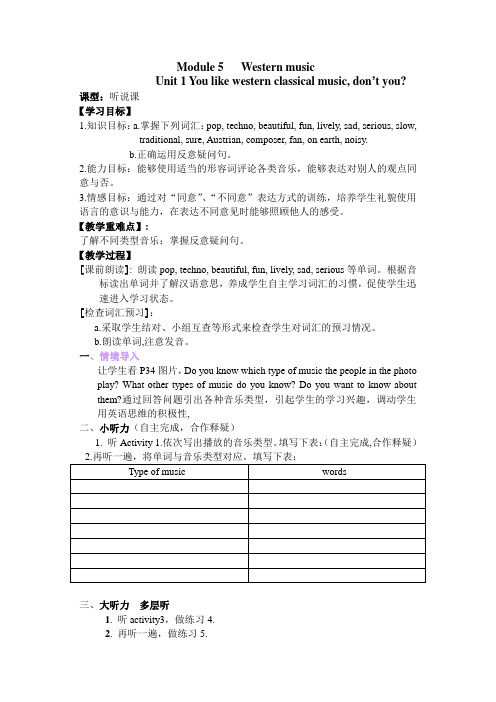
四、理解意思小组间合作解决Activity 2中不懂的地方,教师适时点拨。
五、突破重点与难点(一)对重点内容和疑难问题进行合作探究学习。
1.Who’s it by? It’s by Strauss. 意思是“_______________________________”这里的by是介词,意思是“由……创作(编著、导演、作曲等)“。
例:这是莎士比亚写的一部戏剧。
It’s a play ________ Shakespeare.2.What’s it called? 意思是:______________________“be called”意思是“被叫”,“be+动词的过去分词”是被动语态谓语动词的构成。
例如:她叫Mary. She is called Mary.3. Give us a break!别再烦我们了(让我们清净一会儿吧!)当我们想要告诉对方不要再烦人了,就可以说Give sb. a break!别再烦我了。
______________________4. What on earth is that? 意思是”_________________________________”on earth常放在疑问词的后面,用以加强语气,表示“究竟,到底“。
造句:你到底是谁?___________________________________自主造句:__________________________________________5. 观察下列句子:a.You’ve heard of him, haven’t you?b. Jack was German, wasn’t he?c. She doesn’t like pop music, does she?当我们陈述一个事实,而又不是很有把握,就可以再陈述句后加一个简短问句,称为反意疑问句。
找出对话中所有的反意疑问句。
通过观察后大家发现:①反意疑问句的构成:前肯后______,前否后_________.②反意疑问句的主语必须是代替前面主语的代词。
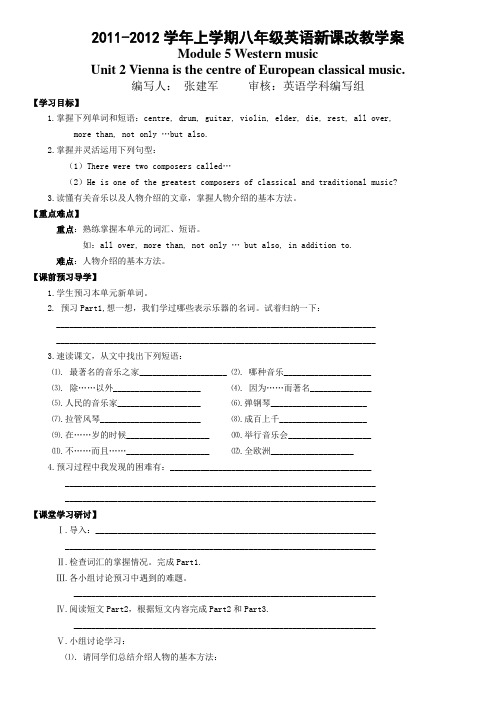
2011-2012学年上学期八年级英语新课改教学案Module 5 Western musicUnit 2 Vienna is the centre of European classical music.编写人:张建军审核:英语学科编写组【学习目标】1.掌握下列单词和短语:centre, drum, guitar, violin, elder, die, rest, all over,more than, not only …but also.2.掌握并灵活运用下列句型:(1)There were two composers called…(2)He is one of the greatest composers of classical and traditional music?3.读懂有关音乐以及人物介绍的文章,掌握人物介绍的基本方法。
【重点难点】重点:熟练掌握本单元的词汇、短语。
如:all over, more than, not only … but also, in addition to.难点:人物介绍的基本方法。
【课前预习导学】1.学生预习本单元新单词。
2. 预习Part1,想一想,我们学过哪些表示乐器的名词。
试着归纳一下:_________________________________________________________________________ _________________________________________________________________________3.速读课文,从文中找出下列短语:⑴. 最著名的音乐之家____________________ ⑵. 哪种音乐____________________⑶. 除……以外____________________ ⑷. 因为……而著名______________⑸.人民的音乐家___________________ ⑹.弹钢琴______________________⑺.拉管风琴_______________________ ⑻.成百上千____________________⑼.在……岁的时候___________________ ⑽.举行音乐会___________________⑾.不……而且……___________________⑿.全欧洲___________________4.预习过程中我发现的困难有:____________________________________________________________________________________________________________________________________________________________________________________________【课堂学习研讨】Ⅰ.导入:_______________________________________________________________________________________________________________________________________ Ⅱ.检查词汇的掌握情况。
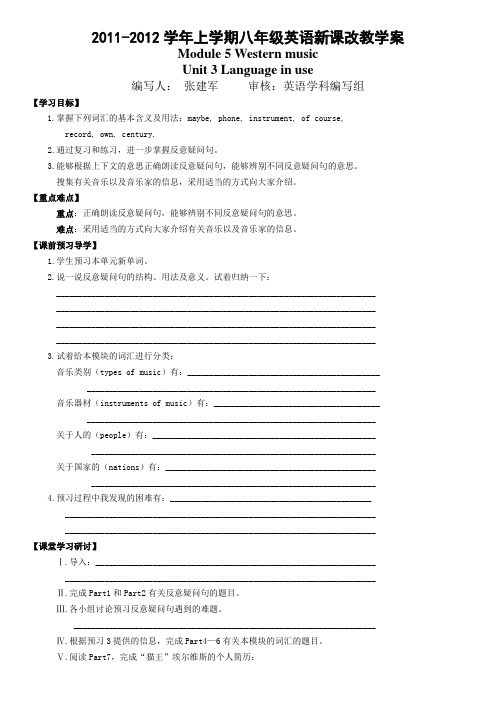
2011-2012学年上学期八年级英语新课改教学案Module 5 Western musicUnit 3 Language in use编写人:张建军审核:英语学科编写组【学习目标】1.掌握下列词汇的基本含义及用法:maybe, phone, instrument, of course,record, own, century.2.通过复习和练习,进一步掌握反意疑问句。
3.能够根据上下文的意思正确朗读反意疑问句,能够辨别不同反意疑问句的意思。
搜集有关音乐以及音乐家的信息,采用适当的方式向大家介绍。
【重点难点】重点:正确朗读反意疑问句,能够辨别不同反意疑问句的意思。
难点:采用适当的方式向大家介绍有关音乐以及音乐家的信息。
【课前预习导学】1.学生预习本单元新单词。
2.说一说反意疑问句的结构、用法及意义。
试着归纳一下:_________________________________________________________________________ ___________________________________________________________________________________________________________________________________________________________________________________________________________________________3.试着给本模块的词汇进行分类:音乐类别(types of music)有:____________________________________________ __________________________________________________________________ 音乐器材(instruments of music)有:______________________________________ __________________________________________________________________ 关于人的(people)有:____________________________________________________________________________________________________________________关于国家的(nations)有:_________________________________________________________________________________________________________________4.预习过程中我发现的困难有:____________________________________________________________________________________________________________________________________________________________________________________________【课堂学习研讨】Ⅰ.导入:_______________________________________________________________________________________________________________________________________ Ⅱ.完成Part1和Part2有关反意疑问句的题目。
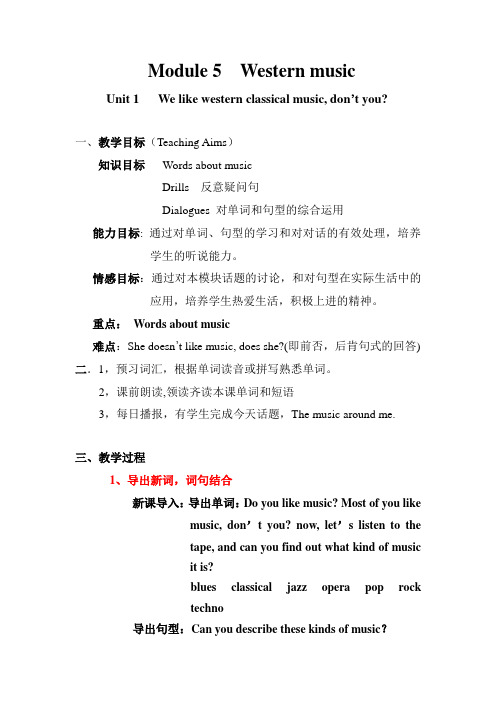
Module 5 Western musicUnit 1 We like western classical music, don’t you?一、教学目标(Teaching Aims)知识目标Words about musicDrills 反意疑问句Dialogues 对单词和句型的综合运用能力目标: 通过对单词、句型的学习和对对话的有效处理,培养学生的听说能力。
情感目标:通过对本模块话题的讨论,和对句型在实际生活中的应用,培养学生热爱生活,积极上进的精神。
重点:Words about music难点:She doesn’t like music, does she?(即前否,后肯句式的回答) 二.1,预习词汇,根据单词读音或拼写熟悉单词。
2,课前朗读,领读齐读本课单词和短语3,每日播报,有学生完成今天话题,The music around me.三、教学过程1、导出新词,词句结合新课导入:导出单词:Do you like music? Most of you likemusic, don’t you? now, let’s listen to thetape, and can you find out what kind of musicit is?blues classical jazz opera pop rocktechno导出句型:Can you describe these kinds of music?beautiful dramatic fast fun lively modern sad serious slowtraditional1.Techno is modern, isn’t it?2.Opera is dramatic ,isn’t it?3.Classical music is traditional and serious, isn’t it?4.Rock music is fun ,isn’t it?5.Blues is slow and sad, isn’t it?6.Pop music is lively ,isn’t it?7.Jazz music is fast ,isn’t it?专项练习:Now class let’s practice this sentence pattern with your deskmates.2.听力训练多层听:Class, now let’s listen to some interesting music,and talk about it !一听:First ,listen to the tape, and complete theform on page 35.4.二听:Listen againYou have heard of him, _______you?He was a German ,__________he?You like western music,_______ you?So she doesn’t like pop music,_____ she?It’s certainly very…traditional ,______it?What on _____is that?听后说:Next let’s say some sentence with theinformation of page 35 .4.请同学们进行对话练习eg. Tony likes classical music, doesn’t he?Yes ,he does.3.对话处理读前听:check the true sentence on page 35 .5.听后读:Read the conversation by yourself and complete the chart.读后学: 1. 短语学习:hear of ;on earth; be sure to do; be sure of2.总结对话中的反义疑问句。
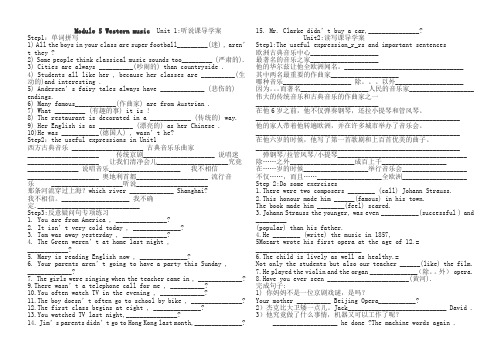
Module 5 Western music Unit 1:听说课导学案Step1:单词拼写1) All the boys in your class are super football_________(迷) , aren’t they ?2) Some people think classical music sounds too_________ (严肃的).3) Cities are always __________(吵闹的) than countryside .4) Students all like her , because her classes are __________(生动的)and interesting .5) Andersen’s fairy tales always have _____________ (悲伤的) endings.6) Many famous____________(作曲家) are from Austrian .7) What _________ (有趣的事) it is !8) The restaurant is decorated in a ____________ (传统的) way.9) Her English is as __________ (漂亮的) as her Chinese .10)He was ___________(德国人) , wasn’t he?Step2:the useful expressions in Unit1西方古典音乐 _____________________ 古典音乐乐曲家_____________________ 传统京剧_____________________ 说唱迷_____________________ 让我们清净会儿_____________________究竟_______________ 说唱音乐_____________________ 我不相信_____________________ 奥地利首都_____________________ 流行音乐 _____________________听说_____________________那条河流穿过上海?which river _____________ Shanghai?我不相信。

Module 5 Western musicUnit 2 Vienna is the centre of European classical music.导学案(读写)班级:组别:姓名:学习目标:基础目标:1.掌握本课的重点单词和短语。
2.通过阅读学习使学生掌握一定的阅读技巧,能理解文章大意并能文章中获取有效信息。
学习过程:【课前延伸】朗读单词,短语centre n.中心 drum n.鼓 guitar n.吉他 organ n.管风琴trumpet n.小号violin n.小提琴elder adj.年长的(尤指家庭成员之间)waltz n.华尔兹;圆舞曲younger adj.年幼的(尤指家庭成员之间)die v.死,去世addition n.添加;添加物in addition to除……以外【课内探究】(一)复习检测1.检查词汇预习2.复习听说课内容(二)读前导入话题导入,完成课本活动1.(三)多层阅读(默读)1.读前听,回答问题:How many composers are mentioned(被提及)in the passage and who are they?2.速度(Fast reading)完成课本活动23.细读(Detailed reading)Ⅰ.阅读Paragraph1,完成填空:Vienna is on the river Danube.It’s the city of and the of European classical music.From 1750 a lot of and came to study and work in Vienna.The most famous family of musicians was . Ⅱ.阅读Paragraph 2--3,判断对错:(1)Strauss’s the younger waltzes made him famous all over Europe. (2)Strauss the elder was even more successful and popular than the younger.(3)Strauss the younger wrote over 400 waltzes.(4)Strauss the elder wrote The Blue Danube in 1687.Ⅲ .阅读Paragraph 4,回答问题:(1)When was Mozart born?(2)What could he play when he was six?(3)What did Mozart write in addition to opera?(4)How old was Mozart when he died?(5)Who do some people say was the greatest European composer?(四) 精讲点拨Ⅰ.Find out the sentences in the passage which have the same meaning.1.He is famous all over the Europe for his waltzes.2.When he was 12, he worte his first opera.3.There were two composers. We call them Johann Strauss: a father anda son.4.He played the piano, the violin and the organ.Ⅱ.Language Points:1. His waltzes made him famous all over Europe.make + n + adj. 使……怎么样这部电影使他兴奋。
Module 5 Western musicUnit 2 Vienna is the center of European classical music.一.教学目标1、语言目标:(1)Words and phrasescentre, drum, guitar, organ ,trumpet ,violin, elder , waltz , younger, die ,addition ,rest(2) Key structure:make sb./ sth . + adj , not only…but also…at the age of2、知识目标:(1)To understand the description of Vienna and composers.(2)To write about Xian Xinghai3、情感目标:To learn something about some great musicians and composers and make students be interested in music.二.学习新课:(一)迅速地读课文,完成下列判断。
.1. Many composers and musicians came to study and work in Vienna.()2. Strauss the younger played the piano, the violin and the organ at the age of six. ()3. Mozart wrote his first opera at the age of 14.()4、The family took Mozart around Europe.()5. The father Johann Strauss died in 1791.()6. Mozart wrote The Blue Danube.()(二)读课文的第一段,回答下面两个问题。
Module 5 Western Music教案1. Aims:(1)To be able to use the new words .(2)To be able to talk about the music you like/ you don’t like.(3)Try enjoying the music.2.Learning methods:self-taught, work in pairs, work in groups3. lead-inAsk the Ss to play the rhythm of the song We Will We Will Rock You.4, Body of the class(1) to show aims of the class(2) a question for the SsHow many sorts of music do you know? what are they?(3) Ss learn the new words of the sorts of music by themselves and try to read the new words.(4) Ss learn some adjectives about music by themselves.(5) Look ,listen and sayTry to point out the type of music for each picture after listening to this piece of music, and try to talk about them.(6) Work in pairsWhat music do you like? Why?(7) convert to the text by asking a question and look at a picture.(8)listening exerciseDo a listening exercise by ticking the true sentences.1. They are listening to western classical music. ( )2. Strauss was born in the capital of Australia.( )3. The Danube is the city in Vienna.( )4. Betty doesn't like pop music.( )5.Daming is a fan of rock.( )(9) watch the video with subtitles about the passage, and then correct the wrong sentence.(10) self-test and summary5. Encourage the Ss to enjoy music, and enjoy their lives.6. HomeworkDo an interview(采访)with your friends about music and write a short report.。
Module 5 Western music I. Teaching objectives 教学目标技能目标听Listen for matching people with the music they like 说Talk about opinions about music读Read a passage about music for information写Write a biography of a composer语■ ■> a ri目标功能句式Talk about musicYou like western classical music, don5t you? Yes, I do. Who's yourfavourite classical composer? Beethoven. She doesn^t like pop music,does she?You've heard of him, haven't you?He was German, wasrTt he?You listen to pop music, don't you?It's certainly very traditional, isn't it?词汇1.重点词汇:pop, techno, beautiful, fun, lively, sad5 serious, show, traditional sure,Austrian, composer, fan, on earth, noisy, centre, drum, guitar, violin,elder, die, rest, maybe, phone, instrument, of course, loud, record, own,century2.认读词汇blues, classical, jazz, rock, dramatic, German, rap, organ, trumpet, waltz,younger, add让ion, actually, type, gospel, string, part-time, milkman,recording, artist, figure3.短语in addition to语法Tag questionsII ・ Teaching materials analyzing 教材分析本模块以Western music为话题,设计了三个部分的内容。
MODULE5 Western Music第二部分:重点单词词组讲解1.classical adj. 经典的;古典的eg.the classical music of India 印度的古典音乐classical composers such as Mozart and Haydn古典派的作曲家如莫札特和海顿1.dramatic adj. 有戏剧性的e.g. a dramatic society 戏剧协会2.lively adj. 活泼的;轻快的e.g.She’s a lively child and popular with everyone.a lively melody 活泼的旋律alive living lively live1)alive 意为“活着”,侧重说明生与死之间的界限,既可指人,也可指物;可用来作表语,后置定语或宾补。
虽有死的可能,但还活着。
例如:The badly wounded soldier was still alive when taken to the hospital .He is dead , but his dog is still alive . 他死了,但他的狗仍然还活着。
No man alive is greater than he . 在活着的人中没有人比他更伟大了。
(注:此时alive 含有“在所有活着的……之中”)He wanted to keep the fish alive . 他想让鱼活着。
2)living意为“活着”强调说明“尚在人间”,“健在”,可用来指人或物,作定语或表语。
例如:Comrade Wang is really a living Lei Feng in our country .My first teacher is still living . 我的启蒙老师仍健在。
English is a living language . 英语的活的语言。
注意:living 前加上the , 表示类别,指“活着的人们”。
例如:The living must finish the work of those dead . 活着的人必须完成那些死去的人的事业。
living 还可用于短语,例如:make a living 谋生。
3)live “活着的”,通常指物,不指人,常用来作定语放名词的前面。
还指“实况转播的”。
例如:a live wire 有电的电线,a live fish 一条活鱼。
Do you like a live show or a recorded show ? 你是喜欢直播还是录音。
He said he had seen a live whale . 他说他看见过活鲸鱼。
make a / one's living by + ing 通过干……谋生4)lively 则意为“活泼的”,“活跃”,“充满生气的”,可作定语、表语或宾补,既可指人,又可指物。
例如:Jenny is a lively girl . 詹妮是个活泼的女孩。
Everything is lively here . 这儿一切都生机勃勃。
He had a strange way of making his classes lively and interesting . 他有一种奇特的方法,使他的课生动有趣。
4.serious adj. 严肃的;严重的e.g.a serious person, mind, appearance严肃的人、心情、外表Her face was serious as she told us the bad news.她告诉我们这个坏消息时脸色很严肃Please be serious for a minute, this is very important.请严肃点儿,这事很重要。
5.traditional adj. 传统的e.g.It’s traditional in England to eat turkey on Christmas Day.圣诞节时吃火鸡是英格兰的传统。
6.Who’s it by?[译文]这是谁创作的?这里的by是介词,意思是“由……创作(编著、导演、作曲等)”。
e.g.I know it’s a play by Shakespeare.我知道这是莎士比亚写的一部戏剧。
7.I’m not sure. 我不确定.be sure 和make sure1).be sure+of/about+动名词或名词,意为“确信……”;“对……有把握”。
但在接名词时,be sure of侧重指主语对某抽象事物的确信无疑He is sure of success.他自信会成功的。
I'm sure of his honesty.我肯定他是诚实的。
若后面要接反身代词,则只能用be sure of,即be sure of oneself,意为“有自信心”。
例如:Joan will sit for an important examination next week,but she is not sure of herself.琼下周要参加一个重要考试,但她对自己没有十分把握be sure+宾语从句,表示主句主语对宾语从句中涉及的事物所作出的判断,意为“确信某事一定会……”。
例如:I'm not sure whether I've met him before.我不能确定以前是否见到过他。
We are sure he will make great progress this term.我们确信他这学期一定会取得巨大进步2) make sure表示“弄确实;核实;查证”。
make sure常用于祈使句,后面常接that宾语从句或of 介词短语。
Make sure + that从句意为“弄明白;确信”。
Make sure + of + 代词/名词,意思也是“弄明白;确信”。
例如:— Make sure of his coming before you set off.— I make sure (that) he would come.8. hear of/about 听说hear from sb 收到某人的来信hear sb do/doing sth 听见某人做某事/听见某人正在做某事9. I am a fan of…我是一个什么粉10.Give us a break![译文]别在烦我们了(让我们清净一会儿吧)!这里Give us a break!语义上相当于Stop annoying us!当我们想要告诉对方不要再烦人了,就可以说Give us a break!e.g.Give me a break! I’m tired of your endless talk.别再烦我了!我已经听够了你那没完没了的话。
11.What on earth is that?[译文]那究竟是什么音乐?on earth常放在疑问词的后面,用以加强语气,表示“究竟,到底”。
e.g.Who on earth told you the news?究竟是谁告诉你这个消息的?What on earth are you doing ?on the earth 在地球上 e.g We are living on the earth.12.I don’t believe it. 我不相信.13.die of 因……而死,原因多来自内部,比如情感、疾病等;eg: He died of hunger. 他因饥饿而死。
die from 因……而死,原因常来自外部,如车祸、地震等。
eg: He died from a fire. 他因一场大火而死。
14.make him famous/happy/angry/sad 使某人出名/开心/愤怒/伤心make sb do sth 使某人做某事make him learn English well 使他学好英语15. Austrian 奥地利人≠Austrilian 澳大利亚人16. be famous for因…而著名 e.g China is famous for the Great Wall.be famous as 作为…而著名 e.g Yao Ming is famous as a basketball player.17.elder adj. 年长的(尤指家庭成员之间)e.g.my elder brother 我的哥哥her elder daughter 她的大女儿比较:older/elderold通常的比较级和最高级形式是older和oldest.e.g.My brother is older than me.我的哥哥比我年龄大。
在比较人的年龄时特别是对于家庭成员,经常使用elder和eldest,用作形容词和代词,这两个词不可与than连用;作形容词时,只能用于名词前:e.g.My elder sister lives in Canada.我姐姐住在加拿大。
I’m the eldest in the family.我是全家年纪最大的。
18. younger adj.年幼的(尤指家庭成员之间)e.g. my younger sister我的妹妹19. actually adv.事实上;实际上e.g.Actually, I’m busy at the moment.说实在的,我现在正忙着。
What did he actually say?他实际上说了些什么?20. record 录音;唱片(1)记录;录音It’s recorded that…据报导……My voice records well.我的声音录下来很好听。
record music from the radio录下无线电广播中的音乐(2)纪录;唱片e.g. put on/play some records放一些唱片[常用搭配]:break a record打破记录held the record保持记录21.own adj.自己的e.g.I saw it with my own eyes.那是我亲眼所见。
It was her own idea.那是她自己的想法。
22.maybe adv. 也许e.g.Maybe he’ll come, maybe he won’t.他也许来,也许不来。
—Is that true?是真的吗?—Maybe, I’m not sure.可能,我说不准。
23.in addition to除……以外e.g.In addition to English, he has to study a second foreign language.除了英语,他还得学第二外语。